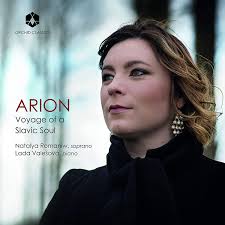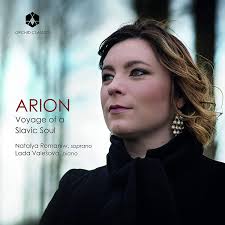David Truslove takes a look at Arion: Voyage of a Slavic Soul by Natalya Romaniw: David Truslove explores a debut recital album that is a deeply personal celebration of Slavic song.

Already a darling of the opera circuit with several major roles under her belt including a recent, but sadly interrupted ENO triumph as Madam Butterfly, Welsh soprano Natalya Romaniw has now produced her debut recital album with Orchid Classics. Arion: Voyage of a Slavic Soul is a celebration of Slavic song and takes its name from Rachmaninov’s Arion about a lone survivor of a shipwreck. Russian and Czech song is the bedrock of this compilation, chosen from a shared passion by Romaniw and her long-standing accompanist Lada Valešová who she met at the Guildhall School of Music and Drama. The disc represents both a culmination of many years of working together and a bond fashioned from their respective backgrounds: a Swansea-born singer whose grandfather was Ukrainian and a Czech-born pianist, daughter of a Russian mother and Czech father.
Arion embraces some bold choices, and if the selections by Janáček, Novák and Rimsky-Korsakov are largely unfamiliar, those by Dvořák, Rachmaninov and Tchaikovsky may provide a recognisable point of departure. The juxtaposition between the seldom performed and much-loved makes this a disc hard to resist, and I can anticipate immersing myself in its treasures for some time to come. I can think of no other Welsh soprano self-assured enough to tackle these songs in their original language for a recording première, especially when there’s strong competition from the likes of Justina Gringytė, Magdalena Kožená and Anna Netrebko. Let’s also not forget Joan Rodgers whose Hyperion recordings prompted one journalist to declare; “No non-Russian singer has done more for Russian song”. I suspect that’s all about to change.
Uniting this collection is a rich vein of melancholic introspection that might be summarised as an indulgence of stargazing and soul searching. At times Natalya Romaniw unleashes a full-throated intensity, moulding the Romantic texts and music with startling focus – superbly so in Rachmaninov’s ‘Spring Waters’ where her bravura account is tailor-made for the song’s determined optimism. Her operatic manner equally suits Tchaikovsky’s ‘Can it be the day?’, its sense of emotional commitment unambiguous from singer and accompanist.
The two are notably successful in conveying the rustic simplicity of four Janáček songs drawn from his Moravian Folk Poetry in Song anthology published in 1908. A sense of less is more emerges in ‘Love’ where Romaniw’s reduced tone perfectly matches the austerity of text and melody. There’s nothing overstated either in ‘Constancy’ where an agile melody anchored by pulsing rhythms evoke a fiddle and stomping feet. More tenderness would be welcome in ‘Rosemary’, while the unbuttoned mood of ‘Musicians’ is charmingly realised.
There’s an engaging tenderness to Novák’s ‘Evening’ and consolation in Rimsky-Korsakov’s ‘Softly the soul flew up to heaven’, the latter unveiling finely calibrated dynamics, its solace profoundly felt. Magisterial control of long-breathed lines occupies ‘Summer Night’s Dream’ and only in ‘The Nymph’ did I wish for a more confiding tone and less vibrato at the top of the stave. That said, her final phrase is of melting beauty.
The melancholic introspection of Dvořák’s Op. 83 Love Songs are sung with real affection, Romaniw bringing intimacy and a darker colouring to ‘So many a heart is as though dead’ and ample expression to ‘In that sweet power of your eyes’, both demonstrating richness of tone. The last of the set, ‘Oh dear, matchless soul’ is exquisite; two artists responding as one to the song’s sweet lyricism, its other-worldly beauty conveyed with a joy that left me searching for superlatives.
Elsewhere amongst these 28 offerings, there’s Romaniw’s fruity legato in Tchaikovsky’s ‘Gentle stars were shining upon us’. How comfortable she sounds in the song’s lower reaches! I also love the mounting passions delivered in ‘Why?’, bringing emotional drama to a new level. If vibrato intrudes in Rachmaninov’s ‘Oh never sing to me again’ or overwrought passions edge towards steel in ‘The Harvest of Sorrow’, there’s much to enjoy in the rapture and lingering phrases of ‘How fair this spot’.
Throughout this generously conceived Slavic programme, Valešová is an ever-sensitive collaborator with a canny ear for balance and characterisation. In short, a soulful collection and highly recommended.
Natalya Romaniw’s Arion: Voyage of a Slavic Soul is now available from Orchid Classics.
David Truslove is an avid contributor to Wales Arts Review.











